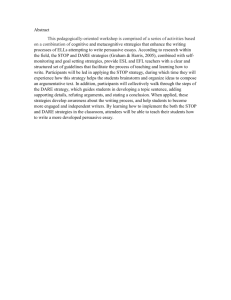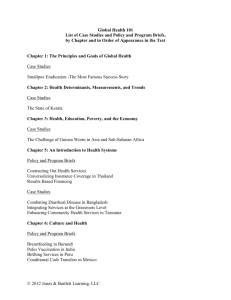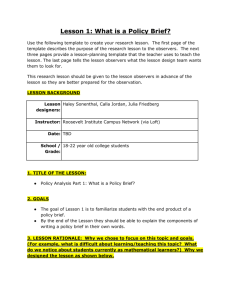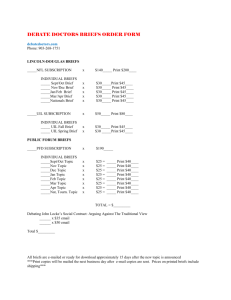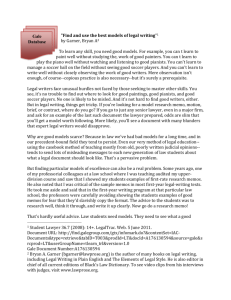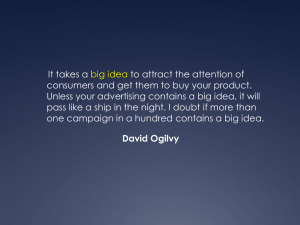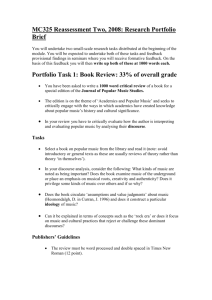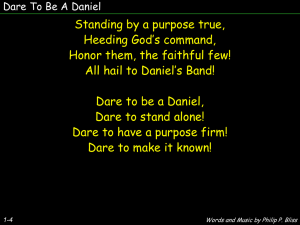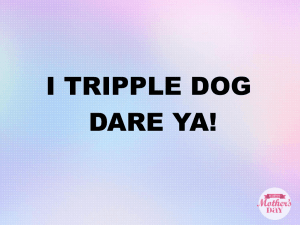Clarity? - Association of Advertisers in Ireland
advertisement
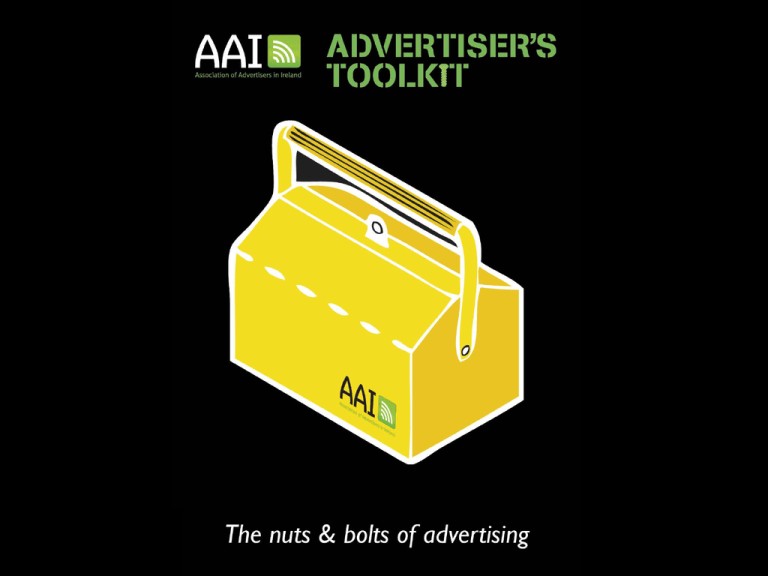
What is the role of the creative brief in the new world of marketing communications? Leo Moore Planning Director Irish International About me • Currently Planning Director at Irish International • Previously; – – – – Planning Director, McCann Erickson Founding Partner, AnalogFolk Media Manager – GB & Ireland, Diageo Group Sales Manager, RTE • What I do: – – – Lead the development of new processes and ways of working Champion the digital evolution of the agency Lead the strategic communications planning on a number of brands including Guinness, Bank Of Ireland, Barry’s Tea and upc. What is the role of the creative brief in the new world of marketing communications? Rapid development of digital tools driving massive changes in consumer behaviour (the emergence of the post-analogue society) THE WORLD IS CHANGING “Our focus should not be on emerging technologies but emerging cultural practices” Henry Jenkins Text “A revolution doesn't happen when a society adopts new tools. it happens when society adopts new behaviors” Clay Shirky 8 There is a massive change in how consumers and brands engage with each other • More participatory • More social and communal • More fragmented • More transparent • More playful • ‘Always on’ • Location increasingly important Traditional (current) approach to briefing • A problem to be solved by advertising • ‘Consumers’ to ‘target’ • A message to say at them • Reasons to believe • Tone of voice • Maybe, if lucky, what media you’re filling Traditional (current) approach to media planning • Impressions • OTS • Reach • Frequency • CPT • Share of voice Advertising = Interruption Images courtesy of Russell Davies Hugh MacLeod – gapingvoid.org The future of advertising isn’t messaging. It’s in ideas that solve business problems in a culturally positive way. A new approach to planning Account Planning Message Content Channels Communications Planning Ideas that drive channel behavior. People engage with ideas, not channels. Media Planning Insight. Excite. Insight. Excite. Key principles Principle No. 1 We need a noble purpose, not a message. Have a point of view on the world, not a position in the category. Levi’s – Go Forth Principle No. 2 It’s not what we say but what we do that matters From peacocks to bowerbirds Peafowl are best known for the male's extravagant tail, which it displays as part of courtship. Bowerbirds are most known for their unique courtship behaviour, where males build a structure and decorate it with sticks and brightly coloured objects in an attempt to attract a mate. Source: Gareth Kay “Briefing in a post-digital world” Fiat Eco Drive Principle No. 3 We need ideas we can advertise, not advertising ideas Vaseline – Prescribe The Nation Walkers - Sandwich Principle No. 4 We need to leave gaps for people to participate Volkswagen – Fun Theory Principle No. 5 We must understand what people are interested in and use ideas as a bridge between these interests and the brand Lurpak – Bake Club Principle No. 6 We must be media positive We should build a balanced and holistic media mix Nike Chalkbot Principle No. 7 We must be agile and fleet of foot Old Spice – The Man Your Man Could Smell Like Principle No. 8 We must think about behaviour, not technology Twelpforce PRE-DIGITAL Interruption POST-DIGITAL Participation Information Inspiration Messaging Actions Targeting markets Creating movements Perception Behavior Big Long All this means how you design, create and evaluate ideas has to change. Does it communicate? Is it magnetic? Is it clear? Has it got depth? Is it likeable? Is it slippy and spreadable? Is it engaging? Is it participatory? Is it replicable? Is it generative? The Creative Brief What is a creative brief? cre·a-tive (krea tiv), adj. 1. having the quality or power of creating 2. resulting from originality of thought; imaginative brief (bref), adj. 1. lasting or taking a short time 2. using few words; concise: a brief report 3. abrupt; curt 4. a short and concise statement or written item. What is the role of the brief? • The bridge between smart strategic thinking and great communication • Designed to improve our chances of having lots of good ideas • Intended to liberate not limit creative thinking • It is the first stage in the creative process Brief Writing – Guiding Principles CLARITY BREVITY CONSISTENCY INSPIRATION Clarity? • Fishing analogy Source: Brief Guide to briefs - Dare CLARITY BREVITY Source: Brief Guide to briefs - Dare BREVITY Source: Brief Guide to briefs - Dare BREVITY Source: Brief Guide to briefs - Dare BREVITY Source: Brief Guide to briefs - Dare Source: Brief Guide to briefs - Dare CONSISTENCY Business Goal Target Audience Brand Proposition Evaluation “Preparation H is of limited interest to a bunch of twentysomething creatives, but it is of incredible interest to someone with piles.” Jeremy Bullmore (paraphrased) Source: Brief Guide to briefs - Dare INSPIRATION The core of the brief GET: The people whose behavior we are trying to change (the audience) WHO: need, want or believe (the insight) TO: Think, Feel or Do something specific (the action) BY: Giving them information, a demonstration, a challenge or an experience (the key message) Kick-starting the ideas process – The bunker session Planning, Creative and Client Service stakeholders workshop the brief for an intensive period. Planning provide context and consumer understanding. The group agrees the main insight and message First cut at creative platform and hero execution Brief agreed collaboratively Making the idea as big as possible – The blow-out session High intensity session with key stakeholders to amplify core strategy and tactics. Ask the critical question: How do we make it Bigger? Then ask it again… And again… ANY QUESTIONS? Thank You
